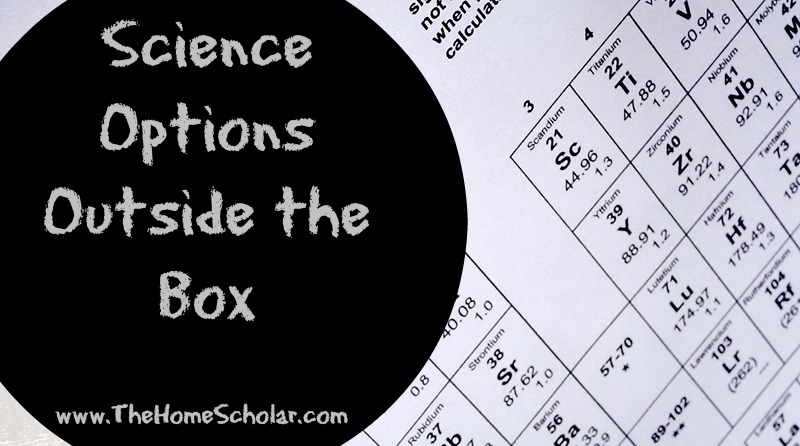This post contains affiliate links. If you click and buy I make a few pennies, but not enough for a latte.
Your child has already taken biology and chemistry classes in your homeschool. What kind of science options outside the box can you come up with next? Unless your child has excelled in math, physics may not be a good option. High school physics is very math-based, and unless your child has completed pre-calculus, I don’t recommend physics for science.
That leaves the rest of us. You know, the mere mortals who don’t dream in algebraic notation. There are some fun science options that are true high school credits without all the math. Biology, chemistry and physics aren’t all there is to a high school science experience! There is so much more to science than just the typical high school science classes. Consider these options:
Science Options Outside the Box
- Advanced Biology – The Human Body, Advanced Biology in Creation: Apologia Homeschool Set is a great advanced biology curriculum offered by Apologia. If your child enjoyed biology, they will probably enjoy this for their next science.
- Ecology – Many public schools focus heavily on ecology, so there are lots of great resources. Check out this handy Ecology: A Pocket Guide and here are some Free Ecology lesson plans online. You can supplement with a textbook if you really want to, but I don’t think it’s necessary.
- Astronomy – If your child loves star-gazing, check out Signs & Seasons: Understanding the Elements of Classical Astronomy. You can find a great telescope and PRESTO! It’s a lab science! Or create your own course, using a great telescope and some simple starter books, perhaps adding the college level lecture series called Understanding the Universe: An Introduction to Astronomy by The Great Courses
- Marine Biology – Check out my Ideas for Marine Biology blog post and pull together some resources that are the best fit for you. For a course like this, it would be best if you live near a body of water, so take advantage if you do!
- Computer science – Programming often counts as a science and the computer lab is simply your home. Check out languages such as C++ or Java. Code Academy offers some comprehensive and free online lessons.
- Geology – There are many great homeschool-friendly resources I’ve seen at conventions. Look at Creation Geology: A Study Guide to Fossils, Formations, and the Flood. I love resources from NorthwestRockAndFossil.com too! Your science lab might include rock hounding in your state. This book will help you get started: Modern Rock hounding and Prospecting Handbook.
More Great Science Resources
You CAN Teach High School Science Lab! This resource will help with the element of teaching science that many parents worry about.
For more homeschool curriculum science options, check out the Index of Cathy Duffy’s Science Reviews.
Looking for even more great science options? Check out the curricula and materials available at Home Science Tools. You’ll find most of what you need there – microscopes, telescopes, lab materials, textbooks and supplements.
Talk to your child and see if you can combine some delight directed learning in your science class and teach your child something they’ll love!
What science are you teaching in your homeschool this year? Please share!



These are great ideas. After using a traditional biology and chem curriculum (with labs), my daughter used a Neuroscience course from Great Courses and did a few other things to make it a full science credit.
Great article. I just wanted to mention that you don’t need a telescope for Signs & Seasons & it will still be considered a science credit with lab. The author encourages hands on sky learning without the use of a telescope.
Texas A&M Agrilife Extension Veterinary Medicine offers a Homeschool Vet Certification Program that can be used as Animal Science or Vet science credit.
Good to know, Penny!
Lee always encourages parents to look at what potential colleges expect in regard to lab science. In her article, Homeschool High School Lab Science Lee says, “Most colleges do not require documented lab sciences. Some colleges do. Usually a college that has specific science requirements will also provide a specific method to achieve it.”
Blessings,
Robin
Assistant to The HomeScholar
Good info, Annette! Thank you for sharing.
Blessings,
Robin
Assistant to The HomeScholar
Dear Kristine,
Good job thinking “outside the box!”
Blessings,
Robin
Assistant to The HomeScholar